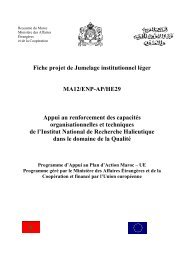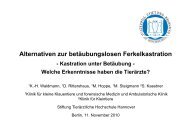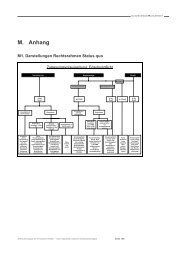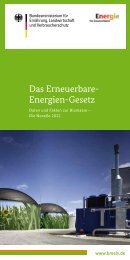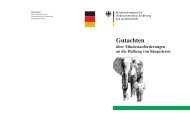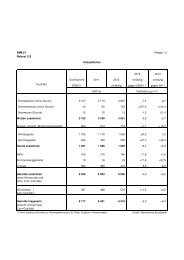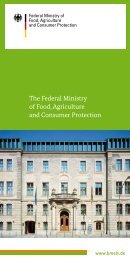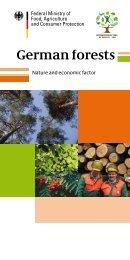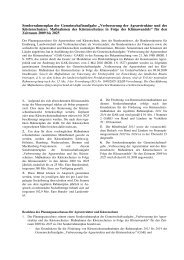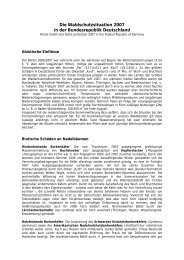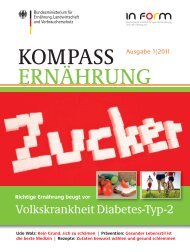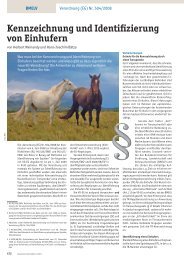Research Institutes overseen by the Federal Ministry of ... - BMELV
Research Institutes overseen by the Federal Ministry of ... - BMELV
Research Institutes overseen by the Federal Ministry of ... - BMELV
Create successful ePaper yourself
Turn your PDF publications into a flip-book with our unique Google optimized e-Paper software.
Foreword<br />
Dear Reader,<br />
The work performed <strong>by</strong> <strong>the</strong> <strong>Federal</strong> <strong>Ministry</strong> <strong>of</strong> Food, Agriculture<br />
and Consumer Protection (<strong>BMELV</strong>) is closely linked<br />
to issues concerning <strong>the</strong> future. These range from securing<br />
food supplies to feed people at home and around <strong>the</strong> world,<br />
<strong>the</strong> type <strong>of</strong> foods that will be available tomorrow, managing<br />
natural resources, efficient use <strong>of</strong> renewable energy (especially<br />
renewable raw materials) to secure energy supplies,<br />
and <strong>the</strong> effects <strong>of</strong> climate change on plants and animals.<br />
In addressing <strong>the</strong>se problems and deciding what policy approaches<br />
to take, <strong>the</strong> availability <strong>of</strong> science-based knowledge<br />
is vital.<br />
21 st century science and research serves to provide this<br />
knowledge. And modern research is reliant on modern<br />
structures. In 2008 <strong>the</strong>refore, departmental research at <strong>the</strong><br />
<strong>Federal</strong> <strong>Ministry</strong> <strong>of</strong> Food, Agriculture and Consumer Protection<br />
switched its focus towards sustainability, excellence and<br />
optimal resource management. The aim is to realign <strong>the</strong> department<br />
and its resources to meet future needs and provide<br />
sustainable structures <strong>by</strong> means <strong>of</strong> simplified bureaucracy.<br />
This resulted in <strong>the</strong> former seven federal research centres<br />
being consolidated to create four new federal research institutes.<br />
The next step was to give <strong>the</strong> new research institutes<br />
greater independence in terms <strong>of</strong> <strong>the</strong>ir organisation, staffing<br />
and budgets.<br />
The focus <strong>of</strong> <strong>the</strong>ir research work mirrors <strong>the</strong> policy areas<br />
covered <strong>by</strong> <strong>the</strong> ministry: plants and crops, animals, food and<br />
nutrition, rural development, forestry and fisheries.<br />
Some <strong>of</strong> our research institutes can draw on more than a<br />
century <strong>of</strong> high-level research work conducted. The new<br />
approach taken to research creates optimal conditions for<br />
research excellence, both to provide <strong>the</strong> federal government<br />
with highly reliable science-based advice and to pave <strong>the</strong><br />
way for <strong>the</strong> emergence <strong>of</strong> <strong>the</strong> knowledge society in matters<br />
<strong>of</strong> food, agriculture and consumer protection. Consolidation<br />
<strong>of</strong> specific research areas and linking <strong>the</strong> various research<br />
institutes to form a network promotes modern, flexible<br />
structures to support future-focused departmental research<br />
at <strong>BMELV</strong> and thus to secure Germany’s future. The German<br />
government sees knowledge as a vital resource: <strong>by</strong> placing<br />
particular emphasis on <strong>the</strong> natural sciences, research at<br />
<strong>BMELV</strong> makes a key contribution to Germany’s standing<br />
in <strong>the</strong> research sector. This serves both policymakers and<br />
society as a whole.<br />
The Leipzig-based German Biomass <strong>Research</strong> Centre (DBFZ)<br />
was called into being to help find ways <strong>of</strong> securing a sustainable<br />
energy supply. <strong>Research</strong> on biomass as an energy<br />
3<br />
source is designed to foster <strong>the</strong> potential harboured in<br />
bi<strong>of</strong>uel development, use <strong>of</strong> bioenergy to combat climate<br />
change and management <strong>of</strong> available resources.<br />
<strong>Research</strong> on food and product safety largely centres on<br />
protecting consumers’ health. Ra<strong>the</strong>r than simply responding<br />
to events, we aim to be pro-active and conduct research<br />
into ways <strong>of</strong> making things safer: breeding research benefits<br />
farmers who must adapt <strong>the</strong>ir practices to accommodate<br />
new management requirements, while development <strong>of</strong><br />
humane production methods serves animal protection.<br />
These are just two examples <strong>of</strong> <strong>the</strong> areas covered <strong>by</strong> our<br />
research department.<br />
This brochure illustrates <strong>the</strong> structures behind departmental<br />
research at <strong>BMELV</strong> and highlights <strong>the</strong> research tasks<br />
assigned to <strong>the</strong> various institutes. Read on and learn more<br />
about a wide range <strong>of</strong> research activities and <strong>the</strong>ir importance<br />
in everyday life.<br />
Ilse Aigner<br />
<strong>Federal</strong> Minister <strong>of</strong> Food,<br />
Agriculture and Consumer Protection



